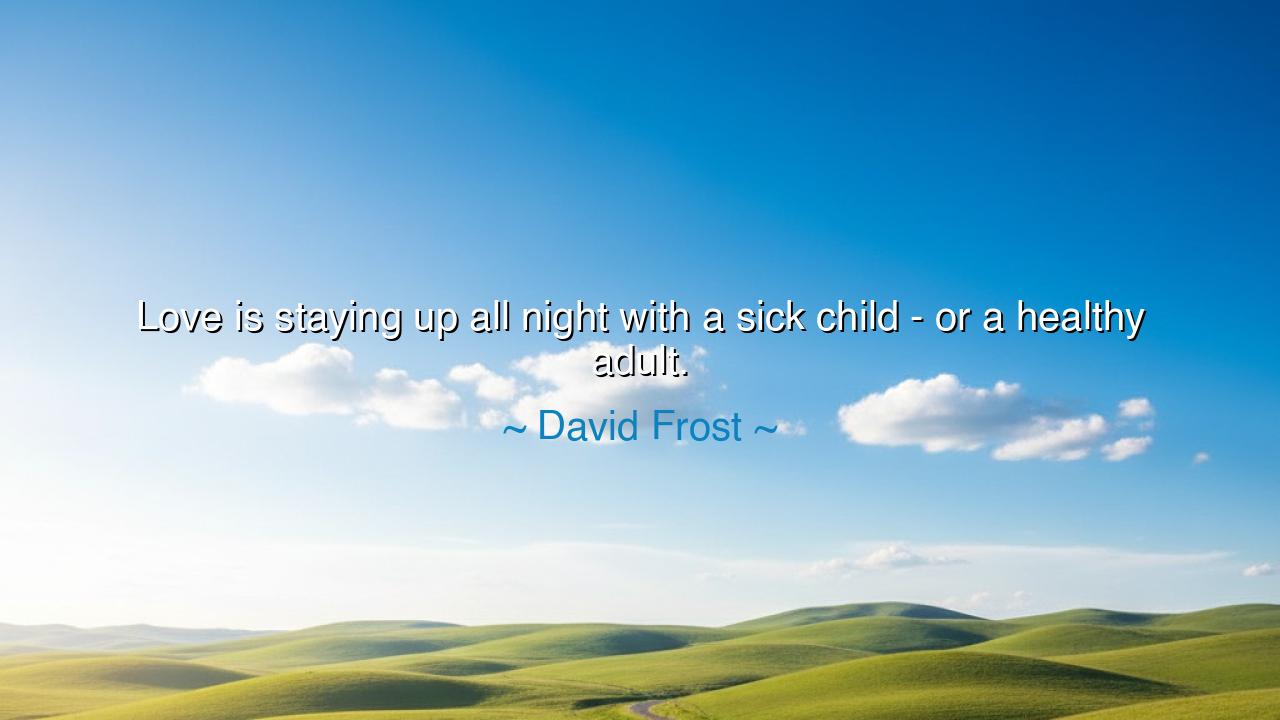
Love is staying up all night with a sick child - or a healthy






David Frost, master of words and observer of the human heart, once said: “Love is staying up all night with a sick child—or a healthy adult.” At first glance, his words are playful, even wry. Yet beneath their humor lies a truth as old as humanity: love reveals itself not in the moments of ease, but in the sacrifices of endurance, patience, and self-forgetting care. Love is not simply a feeling, but the willingness to give of one’s time, one’s rest, even one’s very strength, for the sake of another.
The essence of this saying is sacrifice. To stay up all night is to endure weariness, to set aside one’s own comfort for the well-being of someone else. For the child, it may be necessity—a fever to watch, a body to comfort, a little one who cannot fend for themselves. But Frost sharpens his wisdom with irony when he adds the healthy adult. In this case, there may be no dire illness, no urgent need—yet love still holds vigil, whether through listening, companionship, or simply being present. True love, he reminds us, is not measured by convenience, but by the choice to remain even when there is no gain.
History is filled with such examples. Consider the story of Florence Nightingale, who walked the wards of the Crimean War, tending to wounded soldiers by lamplight through endless nights. Many were strangers, yet her love was revealed not in words but in her refusal to rest while others suffered. She became the symbol of compassion precisely because she embodied Frost’s teaching: love is the readiness to forgo one’s own comfort to preserve the dignity and life of another.
Frost’s choice of child and adult is also profound. The sick child embodies innocence and dependence—the kind of love that responds instinctively, for who could abandon one so vulnerable? The healthy adult, however, represents the paradox of love that gives without necessity, that stays even when there is no crisis. To care for a partner, a friend, or a loved one late into the night simply because they need companionship or support is a higher form of love—it is love given freely, not compelled by weakness or necessity, but offered as a gift.
This teaching also reveals the nature of love as endurance. Love is not proved in a single grand gesture, but in the long hours of quiet faithfulness, in the silent sacrifices that no one else may see. To sit through the night when one longs for sleep, to give patience when one’s body cries for rest—this is where love is tested and found true. Such love cannot be faked, for only genuine devotion can keep the lamp burning until dawn.
The lesson for all who hear is simple and yet demanding: measure your love not by words or feelings, but by your willingness to remain when it costs you something. Ask yourself—who have I stayed awake for? Who have I chosen over my own comfort? For in these choices, love becomes real. Let this wisdom shape your life, that you may give without counting, endure without bitterness, and find joy in the sacrifice itself.
Therefore, let Frost’s words endure as both a reminder and a challenge: love is not the poetry of fleeting emotion, but the steady vigil of the heart. It is found in the sleepless night, the patient listening, the gentle hand that does not abandon. Whether it is for the weak child or the strong adult, the act is the same—the surrender of self for the sake of another. And in such surrender, love shines its truest light, becoming both a comfort to the beloved and a crown of honor to the one who gives it.






AAdministratorAdministrator
Welcome, honored guests. Please leave a comment, we will respond soon